Aditya Sinha
CADRE: Customizable Assurance of Data Readiness in Privacy-Preserving Federated Learning
May 28, 2025Abstract:Privacy-Preserving Federated Learning (PPFL) is a decentralized machine learning approach where multiple clients train a model collaboratively. PPFL preserves privacy and security of the client's data by not exchanging it. However, ensuring that data at each client is of high quality and ready for federated learning (FL) is a challenge due to restricted data access. In this paper, we introduce CADRE (Customizable Assurance of Data REadiness) for FL, a novel framework that allows users to define custom data readiness (DR) standards, metrics, rules, and remedies tailored to specific FL tasks. Our framework generates comprehensive DR reports based on the user-defined metrics, rules, and remedies to ensure datasets are optimally prepared for FL while preserving privacy. We demonstrate the framework's practical application by integrating it into an existing PPFL framework. We conducted experiments across six diverse datasets, addressing seven different DR issues. The results illustrate the framework's versatility and effectiveness in ensuring DR across various dimensions, including data quality, privacy, and fairness. This approach enhances the performance and reliability of FL models as well as utilizes valuable resources by identifying and addressing data-related issues before the training phase.
Learning Structured Representations with Hyperbolic Embeddings
Dec 02, 2024


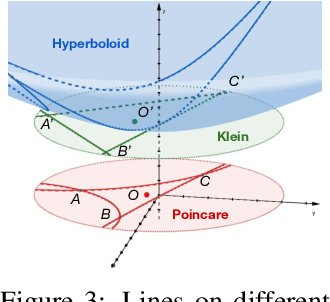
Abstract:Most real-world datasets consist of a natural hierarchy between classes or an inherent label structure that is either already available or can be constructed cheaply. However, most existing representation learning methods ignore this hierarchy, treating labels as permutation invariant. Recent work [Zeng et al., 2022] proposes using this structured information explicitly, but the use of Euclidean distance may distort the underlying semantic context [Chen et al., 2013]. In this work, motivated by the advantage of hyperbolic spaces in modeling hierarchical relationships, we propose a novel approach HypStructure: a Hyperbolic Structured regularization approach to accurately embed the label hierarchy into the learned representations. HypStructure is a simple-yet-effective regularizer that consists of a hyperbolic tree-based representation loss along with a centering loss, and can be combined with any standard task loss to learn hierarchy-informed features. Extensive experiments on several large-scale vision benchmarks demonstrate the efficacy of HypStructure in reducing distortion and boosting generalization performance especially under low dimensional scenarios. For a better understanding of structured representation, we perform eigenvalue analysis that links the representation geometry to improved Out-of-Distribution (OOD) detection performance seen empirically. The code is available at \url{https://github.com/uiuctml/HypStructure}.
Matryoshka Representations for Adaptive Deployment
Jun 01, 2022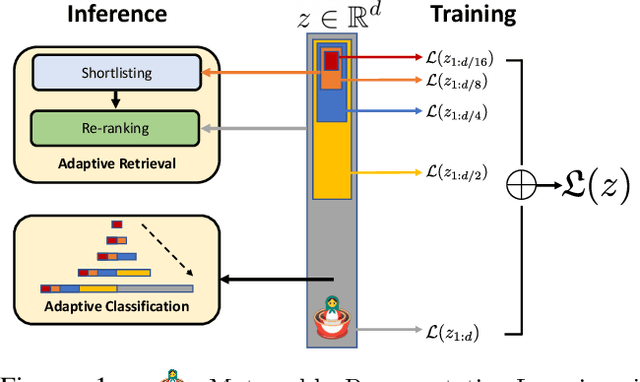
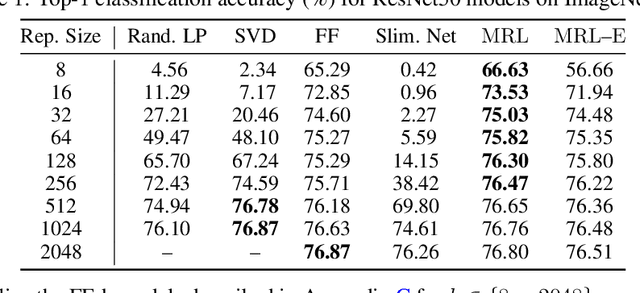
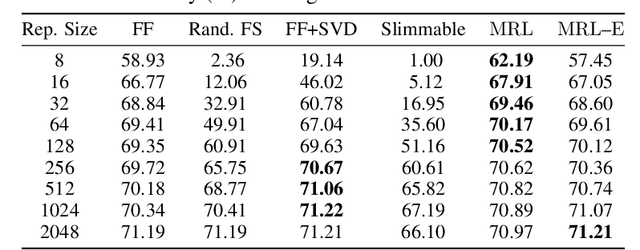
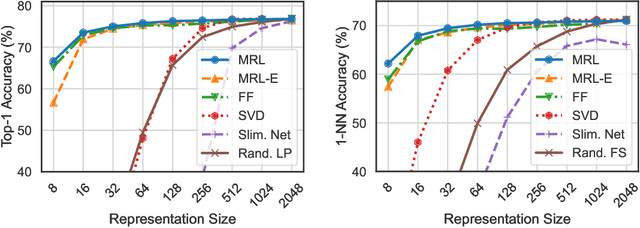
Abstract:Learned representations are a central component in modern ML systems, serving a multitude of downstream tasks. When training such representations, it is often the case that computational and statistical constraints for each downstream task are unknown. In this context rigid, fixed capacity representations can be either over or under-accommodating to the task at hand. This leads us to ask: can we design a flexible representation that can adapt to multiple downstream tasks with varying computational resources? Our main contribution is Matryoshka Representation Learning (MRL) which encodes information at different granularities and allows a single embedding to adapt to the computational constraints of downstream tasks. MRL minimally modifies existing representation learning pipelines and imposes no additional cost during inference and deployment. MRL learns coarse-to-fine representations that are at least as accurate and rich as independently trained low-dimensional representations. The flexibility within the learned Matryoshka Representations offer: (a) up to 14x smaller embedding size for ImageNet-1K classification at the same level of accuracy; (b) up to 14x real-world speed-ups for large-scale retrieval on ImageNet-1K and 4K; and (c) up to 2% accuracy improvements for long-tail few-shot classification, all while being as robust as the original representations. Finally, we show that MRL extends seamlessly to web-scale datasets (ImageNet, JFT) across various modalities -- vision (ViT, ResNet), vision + language (ALIGN) and language (BERT). MRL code and pretrained models are open-sourced at https://github.com/RAIVNLab/MRL.
Node-Level Differentially Private Graph Neural Networks
Dec 06, 2021

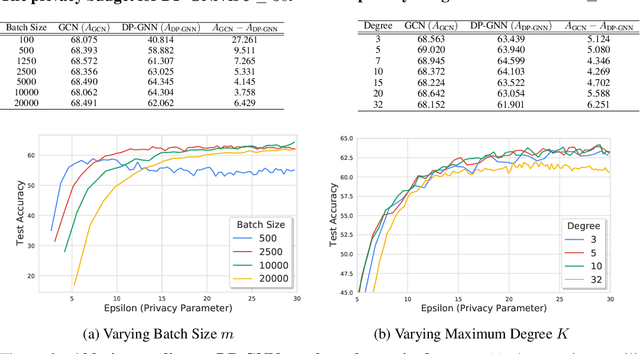
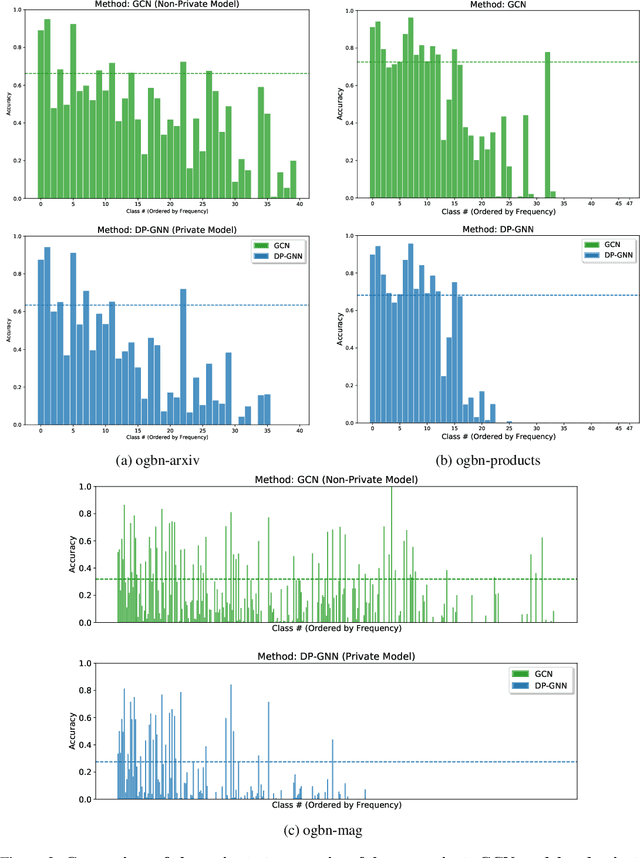
Abstract:Graph Neural Networks (GNNs) are a popular technique for modelling graph-structured data that compute node-level representations via aggregation of information from the local neighborhood of each node. However, this aggregation implies increased risk of revealing sensitive information, as a node can participate in the inference for multiple nodes. This implies that standard privacy preserving machine learning techniques, such as differentially private stochastic gradient descent (DP-SGD) - which are designed for situations where each data point participates in the inference for one point only - either do not apply, or lead to inaccurate solutions. In this work, we formally define the problem of learning 1-layer GNNs with node-level privacy, and provide an algorithmic solution with a strong differential privacy guarantee. Even though each node can be involved in the inference for multiple nodes, by employing a careful sensitivity analysis anda non-trivial extension of the privacy-by-amplification technique, our method is able to provide accurate solutions with solid privacy parameters. Empirical evaluation on standard benchmarks demonstrates that our method is indeed able to learn accurate privacy preserving GNNs, while still outperforming standard non-private methods that completely ignore graph information.
IGLU: Efficient GCN Training via Lazy Updates
Sep 28, 2021

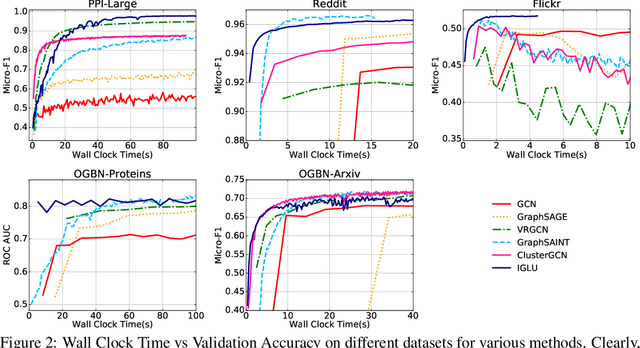

Abstract:Graph Convolution Networks (GCN) are used in numerous settings involving a large underlying graph as well as several layers. Standard SGD-based training scales poorly here since each descent step ends up updating node embeddings for a large portion of the graph. Recent methods attempt to remedy this by sub-sampling the graph which does reduce the compute load, but at the cost of biased gradients which may offer suboptimal performance. In this work we introduce a new method IGLU that caches forward-pass embeddings for all nodes at various GCN layers. This enables IGLU to perform lazy updates that do not require updating a large number of node embeddings during descent which offers much faster convergence but does not significantly bias the gradients. Under standard assumptions such as objective smoothness, IGLU provably converges to a first-order saddle point. We validate IGLU extensively on a variety of benchmarks, where it offers up to 1.2% better accuracy despite requiring up to 88% less wall-clock time.
 Add to Chrome
Add to Chrome Add to Firefox
Add to Firefox Add to Edge
Add to Edge